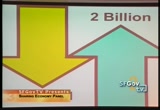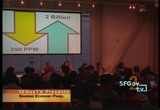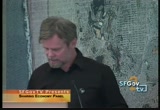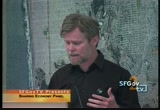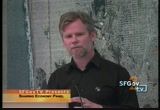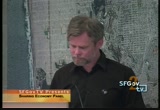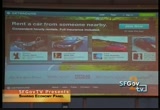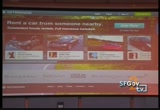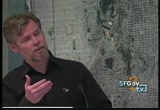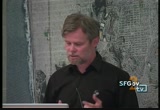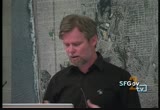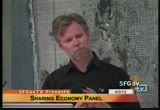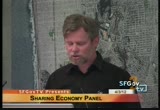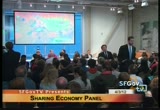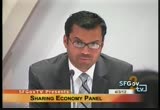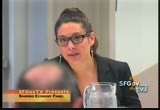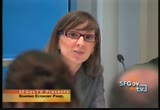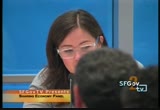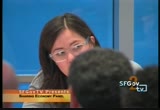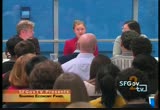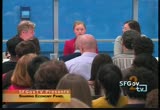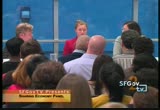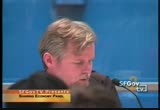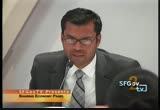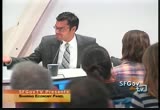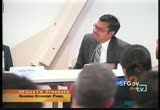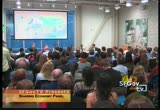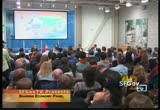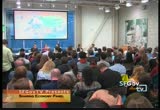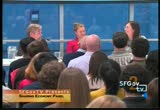tv [untitled] November 9, 2012 9:30pm-10:00pm PST
9:30 pm
the 21st century. the growth the economy we are moving out of hopefully cannot do that. it is what got us into the jam we are in now. you are probably very familiar with the whitney we hear all the time. we're using 40% more resources annually than the earth can replenish. we're draining our natural capital. there has been 15 years of sustainable development with development of new green technologies. in 2011, we have the largest out of carbon ever. inequality has reached epic proportions around the world. in the united states, the richest 1% owned 38% of all wealth.
9:31 pm
the bottom 90% hold 73% of all debt. we are wiping out the planet and the public is left holding the bag. we definitely need something completely different. putting the moral outrage aside for a second, this situation also puts cities at great risk. we've only gotten a taste of the destruction that -- disruption as possible with the numerous revolutions that broke out. the crisis will land hardest in cities. i see city's borrowing language from complexity theory, i see the boys and a critical state. it is a new situation. 50% of global population is urban, young, and connected by
9:32 pm
mobile phones. the young are the hardest hit here. in spain, the unemployment rate for young adults is around 50%. in the united states, college graduates are leaving school with an average of $24,000 in student loan debt into labor market for their age group that has not been as bad as it is today since the depression or the 1940's. the smallest thing can trigger a crisis now. it is a powder keg. on the other hand, along with this crisis is a powerful new set of tools that have arrived so breakthrough is also possible. we have a decision to make. let me talk about the sharing economy and how it plays into this. we define it broadly.
9:33 pm
we see it as a shift from a top- down factory model of society to a pear to peer network model of society. large corporations further consolidate wealth and power in the old system. the emerging sharing economy is democratizing wealth and decision making in new networking modes of production, consumption, and governance. the sharing economy is driven by economic, environmental, and social crisis, also new technologies come a new culture of sharing, and a new generation, the first one raised on the net where schering is part of their value system -- where sharing is part of their value system. there is car sharing, open
9:34 pm
source software. co-working and the collaborative consumption companies with us today. many of the legacy institutions have lost their capacity to serve in some cases. or they have lost their credibility. all of these types of innovations, these share rubble innovations -- shareable innovations are on the rise. they are not centrally- controlled, one-size-fits-all solutions. instead, the increase access to resources locally and globally through market driven and volunteer-based platforms that unleashed the creativity of citizens to create an exchange value directly with each other. it is very adaptable to local conditions. with this economic shift, there
9:35 pm
is also a cultural shift. we are rediscovering that the good life is about the basic things like health and family, community, purposeful work, friendship, spiritual expression. we are discovering access better supports the pursuit of happiness than ownership. let me talk about -- let me give you a couple of examples and the potential impact to give a feel of how this could be a fix. cars sharing is a really good thing to look at. it is the archetype of the sharing economy. it has been around for a while. the research has come out recently. a uc-berkeley study showed once shared car replaces nine to 13 owned cars.
9:36 pm
50% of households who joine, joined to get access to a car that did not have access to the car. the total household the account in the sample size was about 6000. it dropped by 50%. another study found members drove 47% less. if san francisco was able to reduce car ownership in the city by 15,000 units, it would keep an estimated $127 million in the local economy annually. only 20% of the money people pay towards their cars -- it is the second highest household expense. it is over $8,000 for the average car owner. only 20% stays in the local economy.
9:37 pm
i did a calculation. if san francisco reduced car ownership by 50% to 200,000, we would keep an estimated $2.5 billion in the local economy annually and reduce carbon emissions by 1 million carbon metric tons. in this room, we have get around and relay rides. we could have the most powerful economic development program right here. what if the entire economy of san francisco was built around access like car sharing? that is what is happening. that is what these entrepreneurs are doing. the sharing economy is not just about new ways to consume.
9:38 pm
it is also about new ways to produce. it can be a platform for micro- entrepreneurship, creating jobs locally and organically, new technology, shared access models, and online marketplaces have dramatically lower the barriers to resources needed to create products, offer services, and want companies -- launched companies. tools the only large companies could afford are now accessible to the masses. the san francisco tech shop is one example. for a small monthly fee, you get access to construction, $1 million in machine tools, and access to contract manufacturing to bring prototypes to market. also consider the case of member-owned and controlled cooperatives. there are many in the bay area. the u.n. has declared 2012 the
9:39 pm
international year of the cooperative because of their proven ability to give every day people control over their economic destiny. we have a vibrant co-op seen -- scene in the bay area. san francisco can do more to support them through the cooperative model. the main reason we're here today is because this new economic mode calls for new policies. i encourage you to check out policies for a shareable city to see the implications policy was for this new economy coming in with different services. some things we covered our house parking and zoning regulations do not really account for car sharing and parking sharing. hotel regulations are outmoded
9:40 pm
for new businesses. food and restaurant regulation does not fully accommodate the amazing food sharing in san francisco. we believe it would be a mistake to hastily applied 20th- century relations to new 21st century -- to the new 21st century economy. as the mayor said, new research and dialogue are needed. that is why the sharing economy working group and the panel today make so much sense. i want to add one more thing before we go to the panel discussion. these facts may be intellectually stimulating or inspiring, but they do not really speak honestly to my heart. this is what brought me to the
9:41 pm
sharing economy. what i was after was a new way to live in a way that i felt i could live fully. what excites me about sharing is how it changes every day like for the better. it empowers us. the economic shift in the new businesses of creating and exchanging value is creating a new cultural narrative. it is replacing an old legacy narrative that was toxic. it told us the go live comes from shopping and competition -- it told us the good life comes from shopping in competition, from being free from each other. we are leading ving this because it has pushed us to the brink of extinction. it has enslaved as to debt. it is boring.
9:42 pm
it is spiritually empty. there is a news story being born in san francisco. it is one where the more you contribute to the common good, the more you are respected. the better you believe in committee, the more access to what you have -- the better you behave in a community, the more access you have. instead of judging each other, we help each other and realize our greatest potential. we open our world to each other. through doing that, we are liberated. we find freedom through our relationships. i have lived both of these stories.
9:43 pm
the old one almost broke my spirit. the sharing story has saved me. let's continue the discussion about how we can bring more people into that story. thank you. [applause] >> we will start with you. is that ok? >> sure. and the mayor's chief innovation officer, it is a new position created three months ago. i am excited to be part of that. my role is to use new approaches and ideas to solve longstanding civic issues. we launched the mayor's 2012 innovation portfolio the couple of weeks ago.
9:44 pm
a couple of weeks ago. we're looking for volunteers. i have a small team, no budget, which i am really proud of. come join my team. i am bootstrapping things. cities are the original sharing platform. we manage parking through parking meters. we manage books through public libraries. we manage our natural resources through parks. cities have played this role. in this bidding we're having this conversation in san francisco at -- it is negative beating -- it is fitting that we're having this conversation in san francisco at spur. i think it is off somewhere one of the first cities, i think the only city, and has put together a working group around the
9:45 pm
sharing economy. we are the epicenter in san francisco. we have a role to help nurture the emerging space. there is a lot of value to be created here. i am really excited to be part of the panel seeing all of these great people next to me. >> the people on the panel are going to tell us about their companies. let's come straight down the line. >> i am a co-founder and ceo of viable, a community marketplace for travel experiences. anybody can offer their services to others as a guide, offering touristrs, sailing ships, cookig class. we have enabled terrorism -- tourism to access parts of the city it had never before accessed. restoring murals for example.
9:46 pm
we launched in 2011. we have been going for about a year. we're proud to be launched in san francisco and growing the platform here. >> i am the founder of a company called task rabbit, an online marketplace for people to outsource jobs to others. if you need dry cleaning pickup or groceries delivered, you can post that job. one of our over 1000 active task rabbits will be alerted and you will be able to be matched to them. they both run online vetting process that includes an application, background check. we're passionate about the idea of micro entrepreneurship. we have created over 1000 jobs for people in san francisco to
9:47 pm
set their own schedules, say how much they want to be paid, do what they want to do. we're proud to be here, part of the sharing economy, and hearing from you guys as well. >> i am the director of public policy at air b &b. it is an online community market place where residents can lift their haul -- list their homes for rent when they are out of town. i am travelling next week and plan on listing my apartment for rent to a visitor. these hosts are in 19,000 cities. the use the income to afford the increasing cost of living, whether paying off your mortgage, paying rent, or
9:48 pm
expanding income. travels who use the service are looking for a different experience from a hotel. we have hosts in every single neighbor had in the city -- neighborhood in the city that offers authentic experiences. the hosts take pride in being unofficial ambassadors of their neighborhoods. the visitors enjoy the experience. the state average of five nights. that is twice the average of the hotel guests. they patronize local businesses and experience of the city has to offer. -- experience all the city has to offer. >> i am one of the founders of get around. we are a marketplace for cars sharing. we founded the company in 2009 as part of the graduate studies program where we were challenged to come up with an idea that could impact 1 billion people in
9:49 pm
10 years. we believe we are addressing the problem of overpopulation. millions of cars sit idle 92% of the time. because congesting in the city's -- they cause congestion in the city' and burn a hole in your pocketbook. we all have cars that sit there. i am happy to see many of our members in the audience tonight who share their cars and make an average $300 a month. that is a significant amount of money that can offset expenses and be put into the local economy. we believe we are addressing key issues in our city. i am very proud to be your. we chose to launch in san francisco. we felt this was the place to join the sharing revolution. we have about 10,000 cars signed up across the country.
9:50 pm
we are available in four markets. we're lucky to have the backing from the community. a little bit about how it works, you can sign up on your smartphone right now. as a car owner, you would go to the website and list the car you want to share. you have complete control over who you want to share it with. he will get requests. you can decide if it is convenient to share at that time. you can choose just to share with friends or neighbors. we provide the insurance during the rental. it is completely covered. there is nothing to worry about. we were pro-active in drafting the public policy to be innovative by launching a campaign to address this at the state level in 2010. we got a law passed in california that is continuing to go to new states.
9:51 pm
we are excited about that. we're launching more cities. you will see this in more areas. the neat part about what happens with get around is it is building a community. people know who they live next to each other and can help each other out. that is a common theme we have heard. we're also helping the environment because it takes cars off the road. less people have to own cars. never having owned a car, i think that is a good thing. it helps me live a healthier lifestyle. i am excited to be on the panel. >> thanks, jessica. i was putting together a presentation recently with the logos of companies in the sharing economy on the map near
9:52 pm
our office at eco dash working place --at a coworking place. i counted 20 share economy places in my neighborhood. there are new companies launched every week. this is just a small sample, some the leaders in san francisco. jay, give us some background on the sharing economy working group and how you think it benefits san francisco, including underserved communities. >> it is historic we are being thoughtful, looking forward in shaping the policies. mayor lee and board president david chiu and the supervisors announced the sharing economy
9:53 pm
working group. the idea is to look at the issues at play as well as understand the benefits of the sharing economy, whether environmental or economic. you can see with the companies that there is tremendous dahlia to society. it is getting ahead of the curve so that we're not applying outdated rules to a new approach. earlier legislation did not imagine some of these companies. who would have thought there would be peer to peer car sharing. it is transformative. we have a role to play from a city hall perspective to nurture and understand the space better to resolve some of the tensions. >> cars sharing is interesting. cars in america are iconic.
9:54 pm
we identify the good life with them. i wonder what don draper of "mad men" would say about car sharing. he would say "no way. c-- "no way." >> we are going to break out. this is a huge space. we're covering cars, people, entrepreneurship. it is breaking into meaningful pieces. then having working groups around the smaller pieces, car sharing, parking, entrepreneurship, then inviting you and the companies to understand the challenges we face and how we should manage -- modernize our regulatory system to reflect this greatness that
9:55 pm
is happening. >> i get e-mails about people wanting to be on the working group. >> i wish i had an answer. i think we need to get more -- we just announced it last week. it will take some time. " you could always do a rock launch page. molly, let's chat with you. there was a city hearing about applying hotel tax to your rentals. tell us about what happened. >> last wednesday, the tax collector called a hearing to discuss the applicability of the transient occupancy tax to
9:56 pm
short-term rentals and operators. we were concerned about this tax and its applicability to airbnb and our community. they showed up in great numbers at the hearing. our main concern is that we vote regularly to increase our own taxes. i do not think any of us are completely opposed to taxes. our concern is the tax code was written in 1961, long before the sharing economy existed, the internet, and the new thing we call airbnb. something that was written for corporate hotels and guests should not be applied to something that is entirely new,
9:57 pm
to permanent residents of san francisco who are occasionally renting out a couch or bedroom to a visitor, with whom the form great lasting friendships quite often. we announced that the entire city family take time to think about whether the existing laws should apply to the new activity or whether we should create new policies and regulations that apply more appropriately to the activity. we look forward to tackling that with the working group going forward. >> how was the turnout? >> it was a pretty huge turnout. we had about 40 hosts from san francisco, probably more than that. many of them testified. it was an incredibly moving experience. i do not think i have seen a city hearing the was that emotional.
9:58 pm
people are using this income to pay property taxes if they own their home, pay off their mortgages, pay increasing rents. our cofounders could not afford their increasing rent so they blew up an air mattress in their living room and rented it out to make rent. this is incredibly important as a source of income for our hosts. if you are taxing at 15%, we need to do so thoughtfully. >> what was the treasurer's view? how is it different from yours? >> we do not know what the treasurer's view is. we would love to discuss this collaborative lee -- collaboratively. our hosts are interested in this
9:59 pm
topic and to explain what they are willing to pay. they do not have the same resources as a corporate hotel to collect and remit taxes monthly because they are not running a business. this is done occasionally. in my case, probably two weeks a year. we do not know what the treasurer and tax collector think about this. we look forward to speaking with them and having a couple conversation. >> when i went to austin last year, i stayed in the home of a single working mom. it was a good feeling to give her the money. it was a unique experience. she was an artist. i stayed in this trailer full of art. it had two huge styrofoam griffin
87 Views
IN COLLECTIONS
SFGTV2: San Francisco Government Television Television Archive
Television Archive  Television Archive News Search Service
Television Archive News Search Service 
Uploaded by TV Archive on

 Live Music Archive
Live Music Archive Librivox Free Audio
Librivox Free Audio Metropolitan Museum
Metropolitan Museum Cleveland Museum of Art
Cleveland Museum of Art Internet Arcade
Internet Arcade Console Living Room
Console Living Room Books to Borrow
Books to Borrow Open Library
Open Library TV News
TV News Understanding 9/11
Understanding 9/11